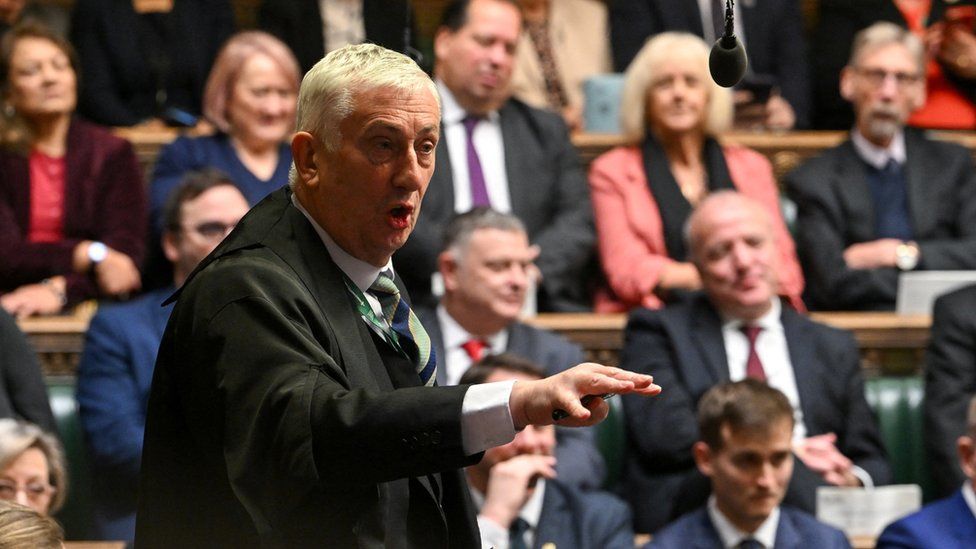ARTICLE AD BOX
 Image source, UK PARLIAMENT
Image source, UK PARLIAMENT
Sir Lindsay, shown here in a previous debate, has been Commons Speaker since 2019
By Paul Seddon
Politics reporter, BBC News
A row has erupted after Commons Speaker Sir Lindsay Hoyle allowed MPs to vote on a Labour motion on the Israel-Hamas conflict.
The amendment from Sir Keir Starmer would allow Labour MPs to back the party's motion calling for an "immediate humanitarian ceasefire".
It means they can call for a ceasefire without backing a differently-worded ceasefire motion from the SNP.
The move is likely to limit potential rebellions over Sir Keir's stance.
The Labour leader suffered a major revolt over the issue in November, when 56 of his MPs, including 10 frontbenchers, defied him to back an SNP motion urging an immediate ceasefire.
Earlier this week, the party shifted its position, following months of pressure from backbenchers and activists.
However, it had been suggested its own ceasefire motion would not be picked for a vote because of Commons rules for the type of debate - known as an opposition day - that is setting it up.
Wednesday's debate has been scheduled for the SNP to put forward its motion. It had been thought this would limit Sir Lindsay's ability to select Labour's own amendment for a vote.
Commons jeers
But in a Commons statement, he said picking the Labour amendment would allow MPs the "widest possible range of options" on the "highly sensitive subject".
It means Labour MPs will be able to formally endorse their own party's new stance at the vote, rather than being left solely with the choice of whether to back or reject the SNP's ceasefire call.
The decision led to jeers from SNP MPs, with one of the party's MPs, Brendan O'Hara, saying his decision to allow a vote on Labour's motion in such circumstances appeared to have "never been done before".
Another SNP MP, Pete Wishart, called the decision "absolutely ridiculous" adding: "He [the Speaker] has totally lost it and this will come back to haunt him."
As well as calling for a ceasefire, the SNP motion urges an end to the "collective punishment of the Palestinian people" and for Hamas to release Israeli hostages.
But Labour argues its wording doesn't make it clear enough that a ceasefire must be observed by both Israel and Hamas.
Its own amendment notes that Israel "cannot be expected to cease fighting if Hamas continues with violence".
It also adds that Israelis had a right to an assurance that Hamas's attack on Israel in October last year "cannot happen again".
Speaking earlier, shadow international development minister Lisa Nandy said that a ceasefire "by definition, means that both sides must lay down their arms".
She argued that Labour's shift in position this week mirrored a change in stance by Western intelligence agencies, as well as changing circumstances since the vote in November.
"What has changed since then is that the humanitarian situation in Gaza has collapsed, the military efforts to rescue the hostages have largely failed, and there's growing concern about the deterioration of the health of the remaining hostages," she added.
'No one's interest'
The government has tabled its own amendment, which Sir Lindsay also picked for a vote, supporting Israel's "right to self-defence" and urging negotiations "to agree an immediate humanitarian pause" in the fighting.
Speaking at Prime Minister's Questions, Rishi Sunak said this approach would "create the conditions for a genuinely sustainable ceasefire".
"Just calling for an immediate ceasefire now, which collapses into fighting in days or weeks, is in no one's interest," he added.
Israel launched its operations in Gaza following an attack by Hamas on southern Israel on 7 October, during which about 1,200 people were killed and more than 240 others taken hostage.
The Israeli military campaign has left more than 29,000 people dead in Gaza, according to the Palestinian territory's Hamas-run health ministry.

 10 months ago
58
10 months ago
58








 English (US) ·
English (US) ·